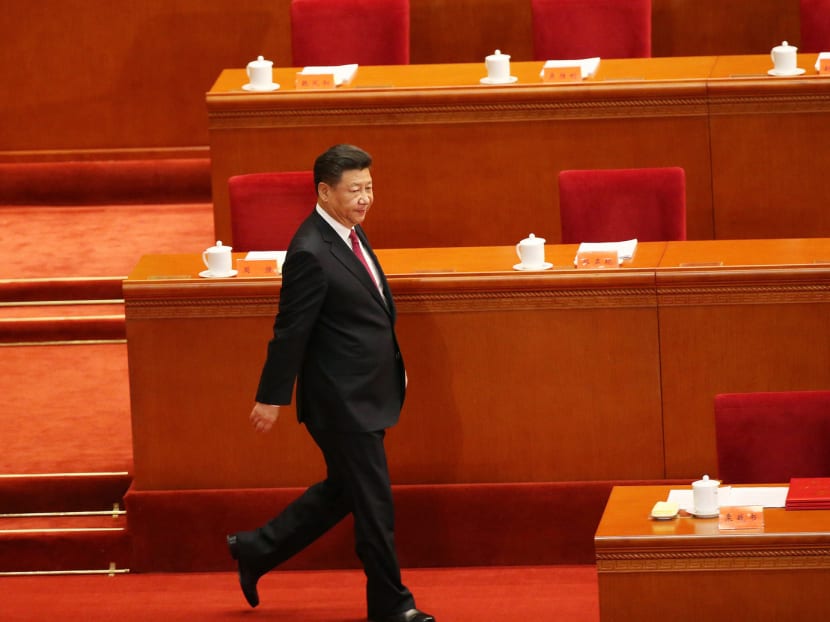Xi warns China will stand firm in the face of challenges
BEIJING — In a speech commemorating the Chinese Communist Party 95th anniversary, President Xi Jinping said yesterday that China will never compromise on sovereignty, adding that while Beijing does not seek to dominate Asia, it will not succumb to military threats.

Chinese President Xi Jinping arriving at the Great Hall of the People in Beijing yesterday. In an unusual move, Mr Xi dedicated a significant part of his speech to foreign policy during a party occasion. Photo: AP
BEIJING — In a speech commemorating the Chinese Communist Party 95th anniversary, President Xi Jinping said yesterday that China will never compromise on sovereignty, adding that while Beijing does not seek to dominate Asia, it will not succumb to military threats.
The ruling party must maintain absolute power in the country, strengthen its military and enhance its role on the world stage, Mr Xi told serried ranks of top officials in Beijing’s Great Hall of the People, to rapturous applause.
“No foreign country ... should expect us to swallow the bitter pill of harm to our national sovereignty, security or development interests,” Mr Xi said.
“We are not afraid of trouble,” he stated during the televised speech.
In an unusual move, Mr Xi dedicated a significant part of his speech to foreign policy during a party occasion, ahead of an international tribunal ruling on overlapping maritime claims between Manila and Beijing on July 12.
Beijing insists that the Permanent Court of Arbitration has no jurisdiction over the issue and has boycotted the proceedings. His remarks come as regional tensions rise over Beijing’s claims to nearly all of the South China Sea. There are overlapping claims by Brunei, Malaysia, the Philippines, Taiwan and Vietnam in the waterway. The United States has dispatched several patrols to the South China Sea, ostensibly to uphold freedom of navigation, drawing Beijing’s ire.
Mr Xi took an apparent stab at the US, saying: “We will not show up at other people’s front doors to flex our muscles. That does not show strength or scare anyone.”
Taking aim at China’s neighbours, many of whom are alarmed by its growing assertiveness over the South China Sea, the President said that confrontation should be replaced by cooperation and the monopoly of international power should be replaced by a win-win mentality. “It is up to all members of the international community to decide what kind of international order and governance system is best for the world,” he added.
Chinese Foreign Ministry spokesman Hong Lei reiterated at a regular press briefing yesterday that more countries were supportive of Beijing’s position on the South China Sea as it had acted in accordance with international law and within its sovereign rights. He said China has also acted as a responsible country in keeping to agreements reached with the Association of South-east Asian Nations.
Mr Hong added that the government of former Filipino president Benigno Aquino had “spun a web of lies” regarding the South China Sea, and by ignoring China’s declaration that the tribunal has no jurisdiction over the case, Manila had “openly flouted the United Nations Convention on the Law of the Sea and unilaterally by force expanded the scope of the convention”.
Since assuming the party’s top post in 2012, Mr Xi has rapidly consolidated power while overseeing a more assertive foreign policy and a tighter authoritarian stance at home.
In his speech, Mr Xi heaped praise on the ruling party and vowed to maintain the country’s centralised communist-led political system.
“All party comrades must remember what we are constructing is socialism with Chinese characteristics, and not any other ideology,” he said. The Communist Party, which had some 88.7 million members at the end of last year, must maintain “absolute leadership”, he said.
Challenged by a slowing economy, Mr Xi has made increasingly frequent appeals for ideological unity, a throwback approach that contrasts with recent Chinese leaders who emphasised delivering economic growth as continued justification for communist rule. Mr Xi has won popularity with a much-publicised anti-corruption campaign that has claimed the scalps of several former top-ranked officials.
“The biggest threat to our ruling party is corruption,” he said, calling for a “complete purification of the party’s political environment”.
He credited the Communist Party with expelling “imperialism” from Chinese soil, and stressed the country’s economic growth in recent decades. He stressed the need for “Mao Zedong thought” but did not refer to the tens of millions killed in famines and political campaigns launched by the founder of the People’s Republic. The speech contained more than 20 references to “Marxism” and was followed by a rendition of the left-wing anthem The Internationale by a brass band.
Mr Xi also issued a warning to Taiwan President Tsai Ing-wen, saying: “We will resolutely oppose all Taiwanese separatist forces.” Shortly before the ceremony began, a Taiwanese warship mistakenly launched a supersonic “aircraft carrier killer” missile towards the mainland, which landed in the Taiwan Strait, said Taipei’s navy. One was killed and three were injured.
Mr Xi vowed to “build, in line with our global status and in accordance with national interests, a strong army and consolidate national defence”. He also said China would take an active role in what he called “global governance”. AGENCIES






